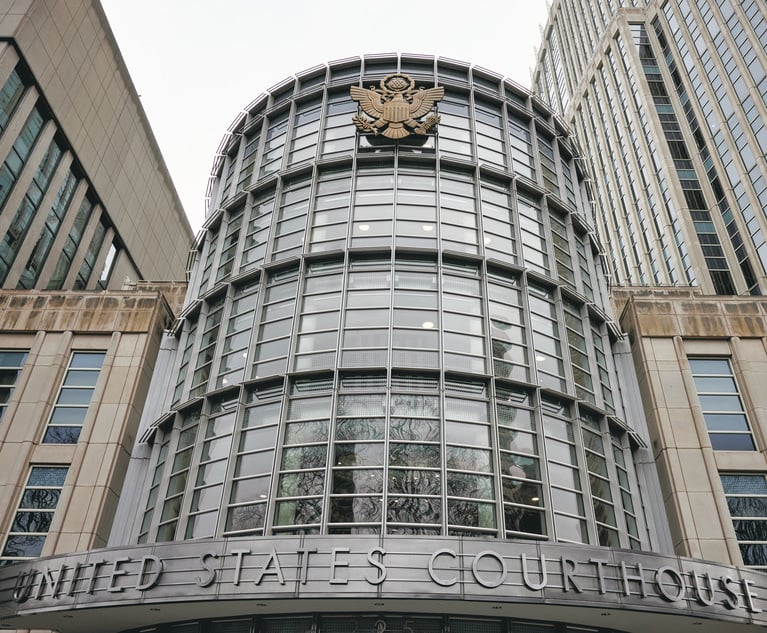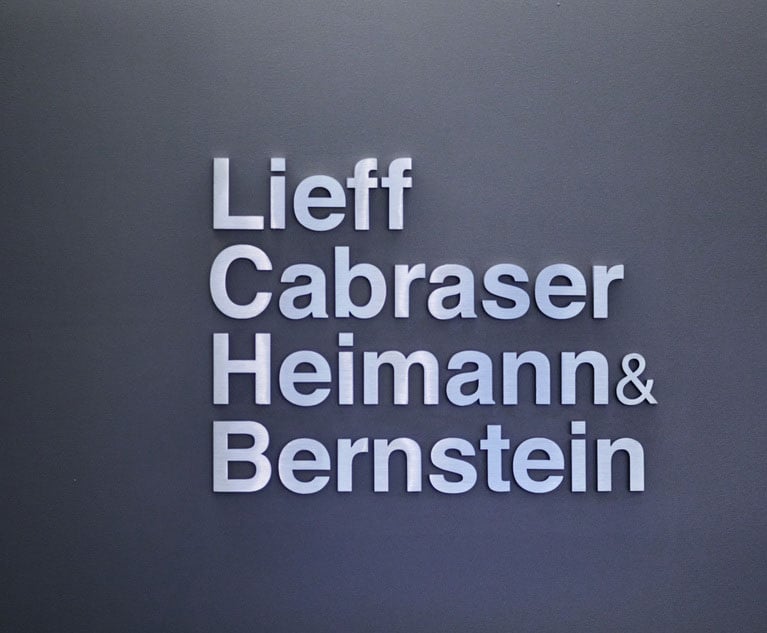 A woman holds a sign protesting police brutality while marching through Wall Street in Manhattan, New York. Photo: Ryland West: ALM
A woman holds a sign protesting police brutality while marching through Wall Street in Manhattan, New York. Photo: Ryland West: ALMLaw Schools Have an 'Obligation' to Help End Racism and Injustice, Deans Argue
Law schools are hosting open forums for students and staff to discuss recent police killings of minorities and systemic inequality, as well as workshops on policing and other relevant legal issues.
June 02, 2020 at 02:45 PM
4 minute read
The original version of this story was published on Law.com
As protests rage across the country over police killings of minorities and systemic racism, legal academics are making the case that law schools, law students and lawyers have a key role to play in promoting justice and ending inequality.
Deans nationwide are sending messages to their communities that they support the protesters as well as students, faculty and staff who are feeling unsettled or devastated by the recent events. Some schools are hosting open forums for students to share their responses to the unrest and its underlying causes, while others are holding workshops on policing and other germane legal topics. But the overarching theme of these communications is that lawyers and law students cannot turn a blind eye to racism and inequality and that the time for action is now.
"Our knowledge, our tools, and our privilege impose on us an obligation to study and learn about all of this, but also to act," wrote University of California at Berkeley School of Law Dean Erwin Chemerinsky in a May 31 statement. "We are the profession responsible for justice."
Chemerinsky invoked the words of Dr. Martin Luther King Jr.'s famous Letter From a Birmingham Jail, noting that "Injustice anywhere is a threat to justice everywhere."
It's not the first time that legal educators have had to decide how to respond in the face of mass protests over racism and police brutality. Law students at numerous campuses staged protests in December of 2014, after the white police officer who killed black teenager Michael Brown in Ferguson, Missouri, was not indicted. Some students requested that final exams be delayed so that they could participate in protests and because they were feeling elevated stress and anxiety.
But the current events are different in that protests are both widespread and happening when the nation is already dealing with the COVID-19 outbreak.
"We are living through an incredibly difficult moment," wrote Dan Filler, dean of the Drexel University Thomas R. Kline School of Law. "People are quarantined due to a global pandemic. We have witnessed the murder of George Floyd and Ahmaud Arbery. There is a leadership void. Every moment is fraught."
But the law school community "cannot look away from the fact that our own government is policing African Americans to death," Filler continued. The Philadelphia school on Wednesday is holding an online forum to discuss the role of discretion in the criminal justice process as well as racism.
At New York University School of Law, Dean Trevor Morrison is encouraging students to get involved through various institutional programs, including the school's Criminal Justice Lab and its Policing Project—which focuses on police reform and accountability.
"The recent killing of George Floyd—whose last words evoke memories of the 2014 death of Eric Garner—is just the latest in a long list of too many other tragedies," he wrote. "While we know the names of George Floyd, Breonna Taylor, and Ahmaud Arbery, there are countless others whose experiences will never make headlines, whose names and stories we will never know, whose lives mattered. This grief weighs heavily on many in our community; I know it does on me."
The University of Florida Levin College of Law is also hosting a forum Wednesday for students to discuss the ongoing events, as well as a similar session Friday for faculty and staff, Dean Laura Rosenbury wrote in a message to the law school community Monday.
"As a law school, we condemn racism and other social inequalities, and we endeavor to provide the tools that will produce lasting change," reads Rosenbury's letter. "We seek to educate the next generation that will promote and improve the rule of law, defend the Constitution, and protect the most vulnerable throughout our society. Much work remains to be done."
The University of Miami on Tuesday hosted a webinar called "Racist Police Brutality and the Role of Law, Lawyers and Law Enforcement in the Problem and its Solutions," that was hosted by Dean Anthony Varona and Ronnie Graham, the incoming president of the school's Black Law Students Association.
Duke University School of Law is also planning to hold an open forum for students in the coming days.
"In our anger, frustration, and sadness over this callous loss of life, we must recommit ourselves to what we do best: ask hard and probing questions, conduct reasoned and thoughtful dialogue, and prepare our students for leadership in the face of injustice," wrote Duke Law Dean Kerry Abrams in her message to the law school.
This content has been archived. It is available through our partners, LexisNexis® and Bloomberg Law.
To view this content, please continue to their sites.
Not a Lexis Subscriber?
Subscribe Now
Not a Bloomberg Law Subscriber?
Subscribe Now
NOT FOR REPRINT
© 2024 ALM Global, LLC, All Rights Reserved. Request academic re-use from www.copyright.com. All other uses, submit a request to [email protected]. For more information visit Asset & Logo Licensing.
You Might Like
View All
'No Evidence'?: Big Law Firms Defend Academic Publishers in EDNY Antitrust Case
3 minute read
'Substantive Deficiencies': Judge Grants Big Law Motion Dismissing Ivy League Price-Fixing Claims
3 minute read
Lippman Study on Antisemitism at CUNY Weighs Free Speech, Unprotected Acts

'Illegal Conspiracy'?: EDNY Antitrust Class Action Challenges Publishers' 'Unpaid Peer Review Rule'
4 minute readTrending Stories
- 1Chiesa Shahinian Bolsters Corporate Practice With 5 From Newark Boutique
- 22 Years After Paul Plevin Merger, Quarles & Brady’s Revenue Up More than 13%
- 3Trade Fixtures In New York Eminent Domain Cases - What Qualifies and How Are They Valued?
- 4Rule of Law: Is Big Law Too Shortsighted?
- 5The Empty Promise of ‘Dubin v. United States’
Who Got The Work
Michael G. Bongiorno, Andrew Scott Dulberg and Elizabeth E. Driscoll from Wilmer Cutler Pickering Hale and Dorr have stepped in to represent Symbotic Inc., an A.I.-enabled technology platform that focuses on increasing supply chain efficiency, and other defendants in a pending shareholder derivative lawsuit. The case, filed Oct. 2 in Massachusetts District Court by the Brown Law Firm on behalf of Stephen Austen, accuses certain officers and directors of misleading investors in regard to Symbotic's potential for margin growth by failing to disclose that the company was not equipped to timely deploy its systems or manage expenses through project delays. The case, assigned to U.S. District Judge Nathaniel M. Gorton, is 1:24-cv-12522, Austen v. Cohen et al.
Who Got The Work
Edmund Polubinski and Marie Killmond of Davis Polk & Wardwell have entered appearances for data platform software development company MongoDB and other defendants in a pending shareholder derivative lawsuit. The action, filed Oct. 7 in New York Southern District Court by the Brown Law Firm, accuses the company's directors and/or officers of falsely expressing confidence in the company’s restructuring of its sales incentive plan and downplaying the severity of decreases in its upfront commitments. The case is 1:24-cv-07594, Roy v. Ittycheria et al.
Who Got The Work
Amy O. Bruchs and Kurt F. Ellison of Michael Best & Friedrich have entered appearances for Epic Systems Corp. in a pending employment discrimination lawsuit. The suit was filed Sept. 7 in Wisconsin Western District Court by Levine Eisberner LLC and Siri & Glimstad on behalf of a project manager who claims that he was wrongfully terminated after applying for a religious exemption to the defendant's COVID-19 vaccine mandate. The case, assigned to U.S. Magistrate Judge Anita Marie Boor, is 3:24-cv-00630, Secker, Nathan v. Epic Systems Corporation.
Who Got The Work
David X. Sullivan, Thomas J. Finn and Gregory A. Hall from McCarter & English have entered appearances for Sunrun Installation Services in a pending civil rights lawsuit. The complaint was filed Sept. 4 in Connecticut District Court by attorney Robert M. Berke on behalf of former employee George Edward Steins, who was arrested and charged with employing an unregistered home improvement salesperson. The complaint alleges that had Sunrun informed the Connecticut Department of Consumer Protection that the plaintiff's employment had ended in 2017 and that he no longer held Sunrun's home improvement contractor license, he would not have been hit with charges, which were dismissed in May 2024. The case, assigned to U.S. District Judge Jeffrey A. Meyer, is 3:24-cv-01423, Steins v. Sunrun, Inc. et al.
Who Got The Work
Greenberg Traurig shareholder Joshua L. Raskin has entered an appearance for boohoo.com UK Ltd. in a pending patent infringement lawsuit. The suit, filed Sept. 3 in Texas Eastern District Court by Rozier Hardt McDonough on behalf of Alto Dynamics, asserts five patents related to an online shopping platform. The case, assigned to U.S. District Judge Rodney Gilstrap, is 2:24-cv-00719, Alto Dynamics, LLC v. boohoo.com UK Limited.
Featured Firms
Law Offices of Gary Martin Hays & Associates, P.C.
(470) 294-1674
Law Offices of Mark E. Salomone
(857) 444-6468
Smith & Hassler
(713) 739-1250






